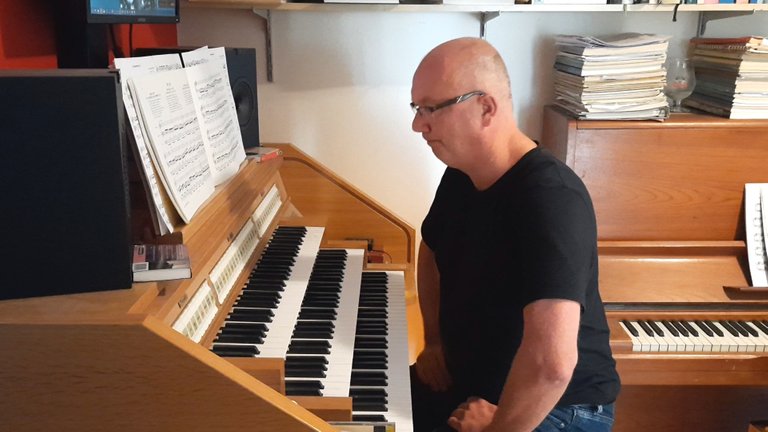Headstrong muscle memory or: The difficulty of relearning a composition
Almost two weeks ago, I played Bach's prelude to "Herr Gott, nun schleuss den Himmel auf", for the Secrets of Organ Playing. Though the performance went reasonably well I was not entirely satisfied with it. As I wrote in that post:
``I think I've played it too fast. It deserves a more relaxed, somewhat more slow tempo. Well, that's music, a performance is never really finished...''

So I decided to record it again, at a somewhat slower tempo. That turned out to be easier said than done.
Practising music is for a large part training the muscles involved in playing. And once you've mastered a piece of music, it is committed to muscular memory. And it is the muscular memory I play from. In other words, I myself do not know how to play a pice, my arms, hands, fingers, legs and feet know how to play. I just sit along and enjoy the ride, so to speak.
Playing a piece in another tempo than initially practised is therefore (for me atleast) very hard to do. Where normally practising a piece of music for a large part means carefully speeding up the playing tempo, I had to repractice this piece, with the intent to slow the playing tempo down.
Arms, hands, fingers, legs and feet did not agree with the new playing tempo. Every time I let my focus on the tempo slip and paid more attention to phrasing or articulation, my body took control of tempo and slid back in the old familiar tempo. Muscular memory is a very hard thing to beat.
I like the new tempo better than the old tempo. My body however disagrees. The performance is there fore a bit wibbly woblly in tempo as my mind and body continuously fight to gain controle of the playing tempo. Overal however, I think this came out better than my initial performance.
What do you think?
Hello
I share the opinion with you that this second video is better. The slower tempo here gives more majestic sound, and you seem to be more relaxed as well. Without hurry 👍
About the muscle memory, it certainly is advantage and disadvantage at the same time, but inevitable part of our playing. When I was younger I relied more in photographic memory (if there is such a word in English? 🤷) I could remember whole pages of music and play it buy heart "looking" from the sheets in my head. I miss now that ability with the ages, so muscle memory rises.
Back to your tempo struggle, I did not notice it, really. So it is in the end a positive thing, we just have to, as you said, "repractice" the work if we want to make some changes. And you did it very well. Good work !
Greetings
Thanks!
That's a handy thing to have (and sad to lose, of course), photographic memory. I never had it. Basically, I don't have much of a memory at all (besides muscle memory 😀). So, I have become very good at sight reading and playing music. Usually I'm reading half a bar ahead of what I'm playing. When the playing overtakes the reading I start making mistakes... :-)
Your post has been supported and upvoted from the Classical Music community (Subscribe at peakd and Steempeak) as it appears to be of interest to our community. We also support jazz and folk music posts!
If you enjoy our support of the #classical-music community, please consider a small upvote to help grow the support account!
You can find details about us below.
The classical music community at #classical-music, Peakd, Steempeak and Discord. Follow our community accounts @classical-music and @classical-radio or follow our curation trail (classical-radio) at Hive Vote or SteemAuto!